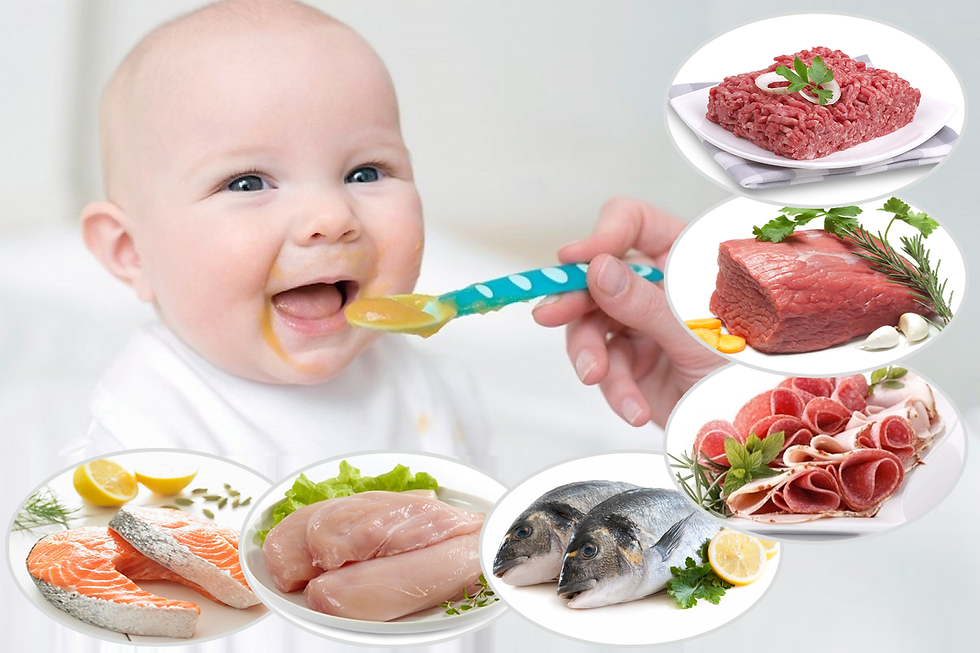Healthy nutrition system for children from 3 to 12 years
- aldaghry
- Jan 3
- 6 min read

The importance of following a diet for children
Following a healthy diet for children is not only a matter of providing them with the energy needed for their daily activities, but it is a fundamental pillar to ensure their healthy growth and development.
Medical studies and research indicate that healthy nutrition for children plays a pivotal role in improving children's general health, enhancing their immunity, and supporting their physical and mental growth.
To achieve this, it is necessary to provide children with a comprehensive set of nutrients to enhance their growth and reduce the risk of malnutrition. UNICEF 1 indicates in its data that at least one in three children suffers from malnutrition and does not grow well due to malnutrition.

Therefore, we find that healthy nutrition for children must provide all the basic nutritional needs. Here is how to follow a healthy diet for children and what are the basic and necessary nutrients for children.
Important nutritional needs for children
Healthy nutrition for children requires providing all the basic nutritional needs that ensure their healthy growth and development. These elements include the following:
1- Proteins:
Proteins are essential for building muscles, tissues, and organs. The Centers for Disease Control and Prevention (CDC Nutrition) (2024) 2 states that proteins contribute to the growth and development of children by supporting the building of tissues and muscles (CDC). Proteins are found in many food sources, the most important of which are:
Lean meats , Poultry, Fish, Eggs , Legumes, Nuts, Vegetables.
For more information about foods and foods rich in carbohydrates, follow the article Sources of Carbohydrates.
3- Healthy fats:
Healthy fats are essential for brain growth and the development of the nervous system in children. They play an important role in the absorption of fat-soluble vitamins such as vitamins A, D, E, and K. The World Health Organization 3 emphasizes the importance of healthy nutrition for children and infants and reports that eating foods rich in healthy fats plays an important role in reducing the risk of chronic diseases. Healthy fats are found in the following foods:
Olive oil, Avocado, Nuts, Seeds, Fatty fish.
4- Vitamins:
Vitamins play a vital role in supporting many bodily functions in children such as immunity, growth, and skin and eye health. A study published by the American Academy of Pediatrics indicates that vitamin deficiency in children can lead to multiple health problems, which emphasizes the importance of consuming them adequately.
Here is a list of foods that contain vitamins in abundance:

Vitamin A: carrots, sweet potatoes, and spinach.
Vitamin C: oranges, strawberries, and sweet peppers.
Vitamin D: Its sources are exposure to the sun, fatty fish, and fortified dairy.
5- Minerals:
All types of minerals play a major role in children's growth and development. Research published by the University of Waterloo Earth Sciences Museum 4 indicates that mineral deficiency can negatively affect children's growth and development. Foods that contain a high percentage of minerals are the following:
Iron: red meat, legumes, and leafy vegetables. Calcium: milk, cheese, and yogurt.
Zinc: meat, nuts, and seeds.
6- Dietary fiber:
Dietary fiber plays a major role in healthy nutrition for children and contributes to improving digestion, preventing constipation, promoting a feeling of fullness, and controlling weight. Harvard University Public Health reported that children who eat sufficient amounts of fiber have better digestive health and are less likely to become obese. Foods rich in fiber are found in the following:
Fruits, Vegetables, Whole grains, Legumes.
Benefits of healthy food for children

Following a healthy diet for children has many important benefits that positively affect their health, growth and development. Here is a list of the most important benefits of healthy food for children:
Proper nutrition rich in proteins and minerals such as calcium and iron is very important for children to support the growth of their bones and muscles. A study published by NIAMS and skin diseases 5 indicated that healthy nutrition during childhood helps achieve healthy physical growth and reduces the risk of skeletal diseases in the future.
Healthy foods that contain fatty acids such as omega-3 help children improve concentration and enhance their retention and memory. These benefits are confirmed by a study published by Vinmec International Hospital 6, which proved that children who follow a diet rich in vitamins and minerals show better academic performance compared to those who follow an unbalanced diet.
Following a balanced diet helps children prevent obesity and reduce the health problems associated with it. Children who eat healthy meals regularly, especially those containing fruits and vegetables, are less likely to become obese.
Eating fruits and vegetables rich in vitamins, such as vitamin C, strengthens the immune system in children and reduces the incidence of infections and diseases. A study published by WebMD 7 reported that children who eat meals rich in vitamins and minerals are more resistant to diseases.
Healthy nutrition for children has a positive effect on children's mental health. A deficiency in some nutrients such as omega-3 and magnesium may lead to behavioral disorders such as anxiety and depression. Therefore, we find that children who follow a healthy diet show lower rates of depression and psychological problems.
Healthy food for children from childhood helps reduce the risk of chronic diseases such as diabetes and heart disease later in life.
Children who eat meals rich in fiber and healthy proteins have a lower chance of developing chronic diseases compared to children who eat unhealthy meals rich in saturated fats and added sugars.
Eating meals rich in complex carbohydrates and proteins helps children boost their energy levels and give them the energy needed to perform daily activities more effectively. Children who eat meals rich in complex carbohydrates and proteins show higher levels of physical activity and academic achievement than those who eat unhealthy meals.

How to plan healthy meals for children?
Planning meals for children requires balancing essential nutrients to ensure their nutritional needs are met and support their growth and development. Here is a list of how to plan healthy meals for children:
Include a variety of foods.
Provide balanced meals for breakfast, lunch and dinner.
Control portion sizes.
Reduce sugary foods and drinks.
Encourage drinking water.
Include healthy fats.
Keep regular meal times.
Unhealthy food for children
Unhealthy food for children is one of the most common problems that parents face. Unhealthy foods contain a high percentage of harmful fats, added sugars, salt, and food additives, and are usually poor in essential nutrients such as vitamins, minerals, and fiber.
Excessive consumption of these foods can negatively affect children's health and lead to many health problems, such as the following:

Harmful effects of unhealthy food for children
Following an unhealthy diet may negatively affect your child in many aspects, the most important of which are:
Overweight and obesity.
Nutrient deficiency.
Poor growth and development.
Weak immune system.
Tooth decay and oral problems.
Digestive disorders.
Poor academic performance.
Low concentration.
Depression and anxiety.
Low self-confidence.
How to deal with common nutritional problems for children?
Some mothers suffer from nutritional problems with their children that directly affect their health and growth. By identifying and dealing with these problems, we can ensure that children receive healthy nutrition that enhances their health. Here is the problem and how to solve it:

1- The child suffers from a lack of appetite:
Some children may suffer from a lack of appetite, which leads to not eating enough food, which leads to a deficiency in the child's basic and nutritional needs.
The solution:
Providing small meals throughout the day instead of three large meals.
Physical activity can help stimulate appetite.
Make mealtime fun by eating with the family
Present foods in an attractive way.
2- Eating too many sweets:
There are many children who eat large amounts of sweets, and this can lead to tooth decay and weight gain.
The solution:
Reduce the number of sweets provided and set limits on their intake.
Provide fresh or dried fruits as an alternative to sweets.
Educate children about the harms of sugar and the importance of moderation in its consumption.
3- Refusal to eat vegetables:
Many children refuse to eat vegetables, which leads to a deficiency in essential vitamins and minerals.
Solution:
Cut vegetables into fun shapes.
Mix them with the child's favorite foods such as sauces or juices.
Let the children help prepare their meals.
Offer small amounts of vegetables and gradually increase them over time.
4- Excessive consumption of fast food:
Eating fast food regularly can lead to health problems such as obesity and heart disease.
Solution:
Prepare healthy meals at home and avoid eating out regularly.
Offer healthy versions of children's favorite foods, such as homemade burgers.

5- Not drinking enough water:
Not drinking enough water can lead to dehydration and other health problems.
Solution:
Use colorful cups or cups decorated with drawings that children like.
Set times to drink water during the day, such as before and after meals.
Add slices of fresh fruit to the water to make it more attractive.
Healthy Eating Tips for Kids.
Here are a set of 8 Health Direct tips to ensure healthy nutrition for children:
Offer a variety of meals such as fruits, vegetables, whole grains, proteins, and dairy products.
Encourage eating fruits and vegetables.
Eat three regular meals.
Avoid soft drinks.
Reduce sweets.
Eat healthy proteins.
Drink water.
Limit fast food.
Teach children about the importance of healthy eating.



Comments